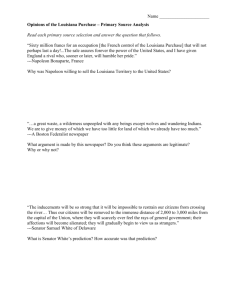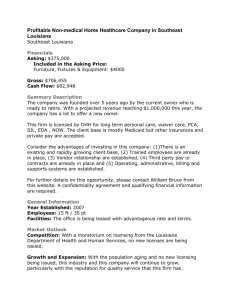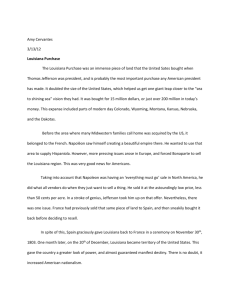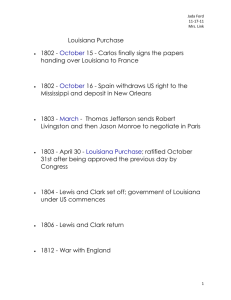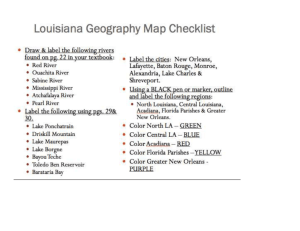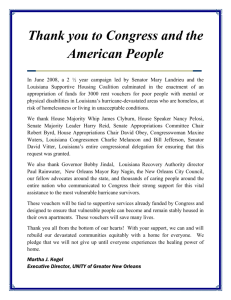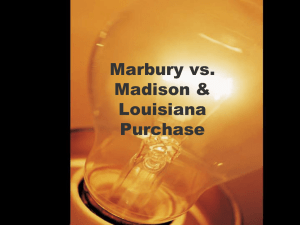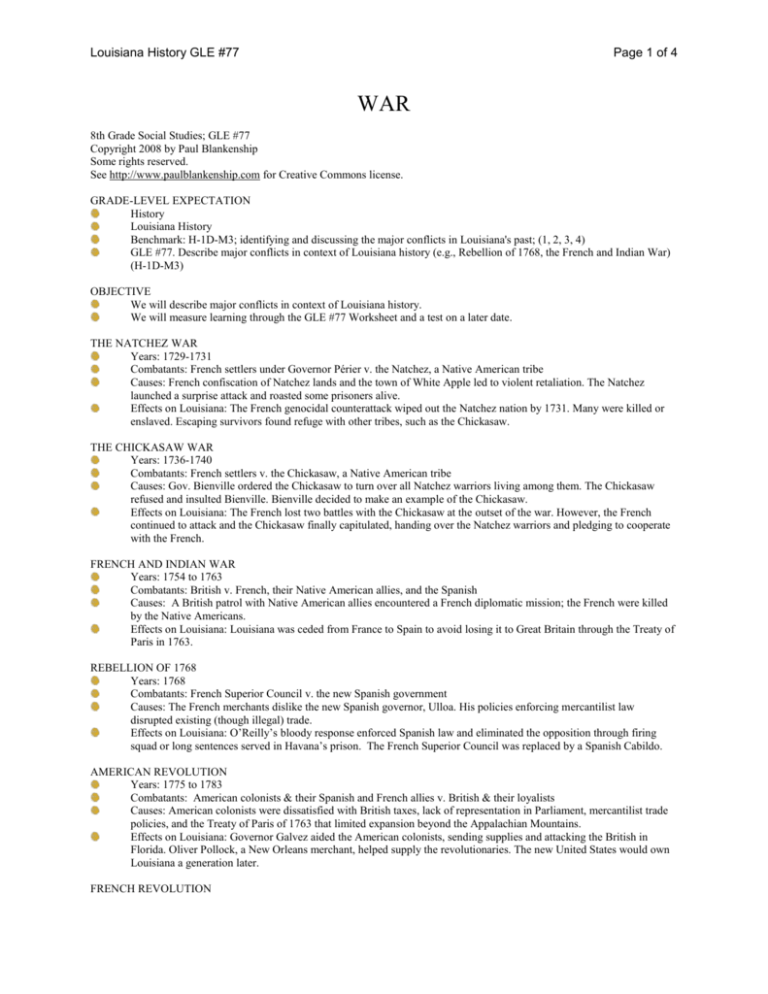
Louisiana History GLE #77
Page 1 of 4
WAR
8th Grade Social Studies; GLE #77
Copyright 2008 by Paul Blankenship
Some rights reserved.
See http://www.paulblankenship.com for Creative Commons license.
GRADE-LEVEL EXPECTATION
History
Louisiana History
Benchmark: H-1D-M3; identifying and discussing the major conflicts in Louisiana's past; (1, 2, 3, 4)
GLE #77. Describe major conflicts in context of Louisiana history (e.g., Rebellion of 1768, the French and Indian War)
(H-1D-M3)
OBJECTIVE
We will describe major conflicts in context of Louisiana history.
We will measure learning through the GLE #77 Worksheet and a test on a later date.
THE NATCHEZ WAR
Years: 1729-1731
Combatants: French settlers under Governor Périer v. the Natchez, a Native American tribe
Causes: French confiscation of Natchez lands and the town of White Apple led to violent retaliation. The Natchez
launched a surprise attack and roasted some prisoners alive.
Effects on Louisiana: The French genocidal counterattack wiped out the Natchez nation by 1731. Many were killed or
enslaved. Escaping survivors found refuge with other tribes, such as the Chickasaw.
THE CHICKASAW WAR
Years: 1736-1740
Combatants: French settlers v. the Chickasaw, a Native American tribe
Causes: Gov. Bienville ordered the Chickasaw to turn over all Natchez warriors living among them. The Chickasaw
refused and insulted Bienville. Bienville decided to make an example of the Chickasaw.
Effects on Louisiana: The French lost two battles with the Chickasaw at the outset of the war. However, the French
continued to attack and the Chickasaw finally capitulated, handing over the Natchez warriors and pledging to cooperate
with the French.
FRENCH AND INDIAN WAR
Years: 1754 to 1763
Combatants: British v. French, their Native American allies, and the Spanish
Causes: A British patrol with Native American allies encountered a French diplomatic mission; the French were killed
by the Native Americans.
Effects on Louisiana: Louisiana was ceded from France to Spain to avoid losing it to Great Britain through the Treaty of
Paris in 1763.
REBELLION OF 1768
Years: 1768
Combatants: French Superior Council v. the new Spanish government
Causes: The French merchants dislike the new Spanish governor, Ulloa. His policies enforcing mercantilist law
disrupted existing (though illegal) trade.
Effects on Louisiana: O’Reilly’s bloody response enforced Spanish law and eliminated the opposition through firing
squad or long sentences served in Havana’s prison. The French Superior Council was replaced by a Spanish Cabildo.
AMERICAN REVOLUTION
Years: 1775 to 1783
Combatants: American colonists & their Spanish and French allies v. British & their loyalists
Causes: American colonists were dissatisfied with British taxes, lack of representation in Parliament, mercantilist trade
policies, and the Treaty of Paris of 1763 that limited expansion beyond the Appalachian Mountains.
Effects on Louisiana: Governor Galvez aided the American colonists, sending supplies and attacking the British in
Florida. Oliver Pollock, a New Orleans merchant, helped supply the revolutionaries. The new United States would own
Louisiana a generation later.
FRENCH REVOLUTION
Louisiana History GLE #77
Page 2 of 4
Years: 1787 to 1799, known as the Revolution of 1789 because the conflict climaxed in that year
Combatants: the French middle and lower classes v. the French aristocracy (the royal family and the nobles)
Causes: The French bourgeoisie (middle class) resented the misrule of the old aristocracy. The philosophes
(intellectuals) advocated for change and reform. The common people were impoverished. The French King Louis XVI’s
support of the American Revolution had bankrupted France.
Effects on Louisiana: Napoleon rose to power in the chaos of the French Revolution. He forced the return of Louisiana
from the Spanish in the Treaty of San Ildefonso in 1800 and sold it to the United States in 1803.
NAPOLEONIC WARS
Years: 1792 (including the French Revolutionary Wars) to 1815
Combatants: The French v. Britain and its allies
Causes: The French Revolution was a threat to the monarchies of Europe. They sought to stop Napoleon’s expansion of
the French Empire.
Effects on Louisiana: Napoleon wanted to expand the French Empire in North America but was limited by the British
Navy and Jefferson’s covert threat to ally with the British against the French should Napoleon reinforce his troops in
Louisiana. Napoleon decided to sell Louisiana rather than risk losing it with no compensation.
WAR OF 1812
Years: 1812 to 1815 (including the Battle of New Orleans, fought after the Treaty of Ghent was signed on 25 December
1814)
Combatants: The United States v. Great Britain
Causes: The British impressment (capture and forced servitude) of American sailors and the American goal of
conquering Canada to expel Britain from North America.
Effects on Louisiana: The British invaded Louisiana but were soundly beaten by General Andrew Jackson with help
from local allies such as Jean Lafitte.
MEXICAN-AMERICAN WAR
Years: 1846 to 1848
Combatants: United States v. Mexico
Causes: The United States annexed the Republic of Texas by mutual agreement. The Mexican government objected.
Border skirmishes erupted into a full-scale war. The United States won, taking about a third of Mexico.
Effects on Louisiana: Louisiana was no longer a border state after the annexation of Texas. The young officers of the
Mexican-American War formed the leadership of both sides of the Civil War. The Whig Party had opposed the popular
war and support for the Whigs declined.
CIVIL WAR
Years: 1861 to 1865
Combatants: The Confederate States of America v. the United States of America
Causes: The CSA believed they had the right to leave (secede) from the USA. The northern states, dependent on
southern cotton, fought against southern secession. Northern abolitionists objected to slavery in the South. Southern
planters resented protectionist tariffs that favored northern industry over southern agriculture.
Effects on Louisiana: Louisiana was prosperous before the war but many Louisianians were enslaved. The Civil War
devastated Louisiana but ended the evil practice of slavery.
SPANISH-AMERICAN WAR
Year: 1898
Combatants: The United States v. Spain
Causes: Cuban rebels began a fight for independence from Spain in 1895. “Yellow” journalists in the United States
exaggerated claims of Spanish atrocities in Cuba. The U. S. S. Maine exploded in Havana’s harbor. The United States
blamed Spain for the explosion. The United States recognized Cuban independence; Spain declared war on the United
States. The United States easily won and took Cuba, Guam, Puerto Rico, and the Philippines.
Effects on Louisiana: Some Louisianians fought in the Spanish-American War.
WORLD WAR I
Years: 1914 to 1918
Combatants: The Central Powers (Germany, the Austro-Hungarian Empire, and others) v. the Allies (Great Britain,
France, Russia, and later the United States)
Causes: The assassination of the heir to the throne of the Austro-Hungarian Empire by a Serbian terrorist triggered a
series of secret treaties. The treaty obligations pitted many European nations against one another in two large alliances:
the Central Powers and the Allies.
Louisiana History GLE #77
Page 3 of 4
Effects on Louisiana: Louisianians fought in WWI. WWI caused an increased demand for cotton that brought temporary
prosperity to some. The price of cotton again declined in the 1920s. Disgruntled rural cotton farmers wanted better roads
and a more responsive government. They would support Huey Long in 1928.
WORLD WAR II
Years: 1939 to 1945
Combatants: The Axis Powers (Germany, Japan, and Italy) v. the Allies (Great Britain, France, and later the Soviet
Union and the United States)
Causes: Hyperinflation in post-WWI Germany created a sense of desperation. Adolf Hitler used propaganda to get
elected and then ended democracy in Germany. He then set out to unite all German-speaking regions with Germany as
an excuse for conquest. His invasion of Poland led to war with France and Britain. Hitler erred by attacking the Soviet
Union in June 1941 because he could not sustain a war on two fronts. The Japanese attack on Pearl Harbor brought the
United States into WWII in December 1941.
Effects on Louisiana: Massive training maneuvers were held in Louisiana. Many Louisianians fought in WWII.
THE COLD WAR
Years: 1945 to 1991, the periods of greatest tension were from 1948 to 1953 and the Cuban Missile Crisis of October
1962
Combatants: The Soviet Union & allies v. the United States & allies
Causes: The Soviets worked to expand communism while the Americans sought to contain communism and maintain
democratic capitalism.
Effects on Louisiana: The United States maintained a high level of military spending, providing jobs in Louisiana
through military bases (such as Barksdale Air Force Base) and military contractors.
KOREAN WAR
Years: 1950 to 1953
Combatants: North Korea (backed by Red China and the Soviet Union) v. South Korea (backed by a United Nations
force led by the United States)
Causes: North Korean dictator Kim Il-sung convinced Soviet dictator Joseph Stalin to support and equip an invasion of
South Korea to expand communism.
Effects on Louisiana: Louisianians fought in Korea. Communism was contained in North Korea; South Korea remains a
capitalist democracy.
VIETNAM WAR
Years: 1954 to 1975
Combatants: Communist North Vietnam and Viet Cong insurgents v. South Vietnam, initially held by the French and
later helped by the United States and some allies
Causes: Vietnamese nationalists fought for independence from France. They turned to the communist powers for
support. After France gave up control in 1954 the communists attacked South Vietnam to expand communism. China
and the Soviet Union provided supplies and weapons to North Vietnam. The United States increased its presence from a
few advisors in the 1950s to 500,000 military personnel by 1969. The cost and unpopularity of the Vietnam War led to
U. S. withdrawal and a communist victory in 1975.
Effects on Louisiana: Louisianians fought in Vietnam. Many Vietnamese escaped communism and immigrated to
Louisiana.
GULF WAR
Year: 1991
Combatants: Iraq v. the United States and its allies
Causes: Iraq invaded Kuwait. The United States led an alliance to expel the Iraqis and reinstate the government of
Kuwait.
Effects on Louisiana: As always, Louisianians fought for their country.
WAR ON TERROR
Years: 2001 to the present
Combatants: The United States v. Fundamentalist Islamic Terrorists
Causes: The terrorist attacks of September 11, 2001 required a strong response and continued vigilance. The United
States struck the Taliban in Afghanistan for harboring Al-Qaeda and later attacked Iraq in the belief that dictator Saddam
Hussein might be developing weapons-of-mass-destruction (WMDs) for use by terrorists.
Effects on Louisiana: Louisianians fight in the War on Terror. The Department of Homeland Security operates in all
fifty states, including Louisiana.
CONCLUSION
Louisiana History GLE #77
Page 4 of 4
Conflict has always been a part of human existence.
Louisiana has endured many conflicts.
Louisianians have defended their state and the interests of the nation through each of these conflicts. Many paid the
ultimate price.


